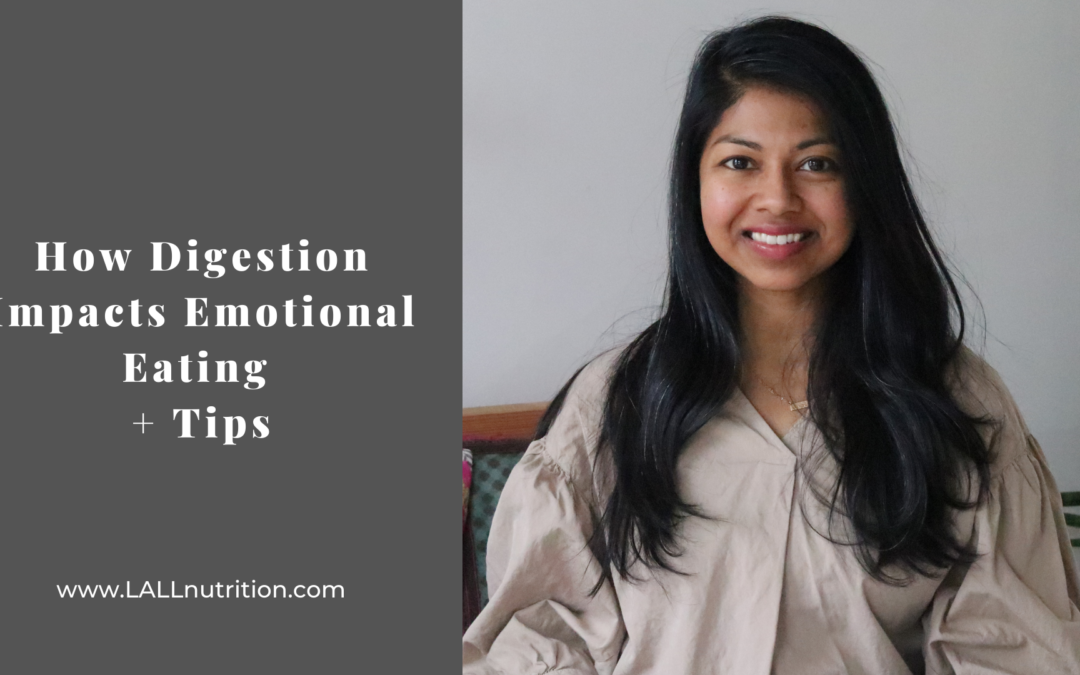Hello love,
Today I want to share how our digestion impacts our emotional eating. I am going to share how digestion connects to our emotional eating. This is something we might miss as an emotional eater because we’re trying to control the foods we’re eating and control our emotions. We don’t necessarily look at how we’re digesting our foods.
And I know for me, digestion was so key to helping me feel good in my body. This helped my mood so I didn’t emotionally eat as much. It’s something that has helped so many clients. It’s also something we really miss because it’s not conventionally taught to us.
So how does digestion impact your emotional eating?
Digestion is when we’re physically and chemically breaking down food into smaller and smaller pieces.
If our digestion is off we may have gas after a meal, bloating, constipation, feeling heavy, not feeling satisfied, just feeling overly stuffed after a meal, not having daily bowel movements. Just feeling kind of awful and sluggish and tired after a meal.
When the digestive process is off…
1. When our digestion is off that is telling us that the digestive process doesn’t have the right enzymes or stomach acid to really break down that food.
2. Or maybe we weren’t even chewing the food properly.
3. Or we weren’t in a really calm state when we were eating our meal.
When we have indigestion, that essentially means that the food we are eating isn’t broken down into the smallest pieces possible or in the smallest pieces that’s needed. We want to break down our food into the smallest pieces possible so that our body, our intestines can absorb it because that’s how we actually get nutrients into our body.
When the food pieces are the right size it’s absorbed by the digestive system. If the food is not digested and it’s in bigger chunks that can be absorbed. When it gets into the small intestine where most of the absorption occur and the chunks of food are are bigger than what our body can absorb, the bad bacteria feed on them, creating gas, creating bloating, creating compounds that can be neurotoxins.
Neurotoxins make us feel foggy and our brain is not functioning optimally. The good bacteria can’t really feed on those bigger chunks of food because the food wasn’t broken down to small enough pieces. The good bacteria in our digestive system produce compounds like like serotonin (the happy neurotransmitter). About ninety five percent is produced in the gut. So if the bad bacteria are being fed versus the good you’re going to feel more foggy and be in a poor mood after a meal. So if you have this chronic digestive symptoms, that’s what’s happening.
What this does for an emotional eater…
When the brain is not feeling good, your moods are off. This happens is because our digestive system is connected to our brain via the vagus nerve. There’s constant communication, so it impacts our moods. And when our moods are down as an emotional eater, what do you do?
You go towards more food and you probably go towards the foods that make you feel good, that are more processed, that are more give you a little bit of a high. You eat a lot of it because now you’ve been triggered into not feeling great. So what that does is then you go and eat all these foods when you’re not truly hungry. This sets you up for more indigestion; feeling stuffed, bloated and guilty. This can start a cycle of emotional eating.
This is what’s happening when we have poor digestion, when we’re eating foods that are not digesting in our body.
Why is this happening….
- You are not setting yourself up to digest well. You are in fight or flight mode vs. rest and digest mode.
- You’re eating foods that are not great for your body’s constitution. That are hard for your body to digest (no matter what the popular nutrition is saying).
- You might not be eating foods in the right combination. So you’re not starting your day in a way that you’re digesting your breakfast and then your lunch and then your dinner. You’re kind of piling food on top of each other. And at each meal is not digested properly because certain foods need a certain amount of time to digest. For example fruits and vegetables digest in a very short amount of time versus more animal based products and meat which take a lot longer to digest.
- if we’re eating mechanically and not really tuning into our body and our true hunger, we might be eating when we’re not necessarily hungry. This makes our digestion worse. This is one factor in the emotional eating cycle.
When our digestion is off, that triggers bad moods and that makes us want to emotionally eat more. Digestion is key to nourishing our body so it’s important to optimize it.
If you feel like you need more support in this area, this is one of the key areas that I cover in my emotional eating evolution program. It’s a four phase program. The first phase is true nourishment + strategic digestion. We go into the details of how to structure your day so that you’re truly nourishing your body and optimizing digestion so that your mood is balanced. This is one way to minimize emotional eating. The program also goes into other factors that contribute to emotional eating.
If you’re interested I invite you to book a complimentary assessment and call HERE. I would love to speak to you 🙂
To optimized digestion,
Michelle
Certified Holistic Nutritionist + Emotional Eating Expert


